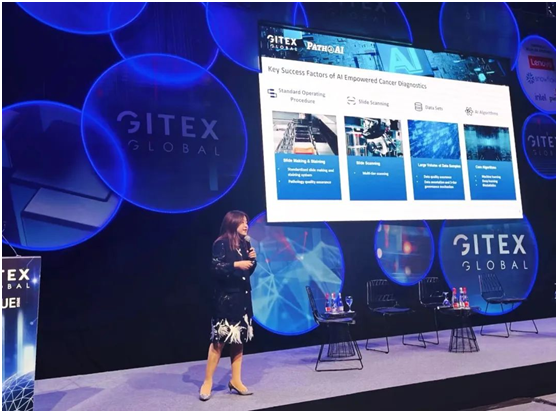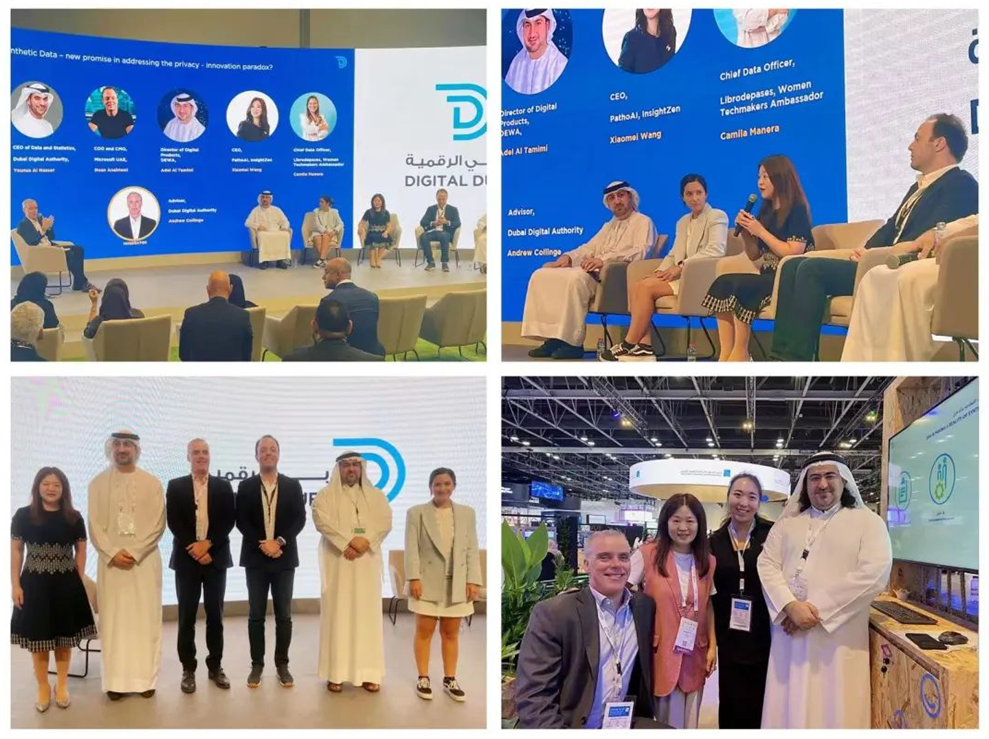GITEX GLOBAL 2022, the world’s largest, most inclusive tech & startup event, was held at the Dubai World Trade Center in the United Arab Emirates on October 10-14 2022. PathoAI, a subsidiary of Dian Diagnostics, was invited to the conference showcasing its leading artificial intelligence technology and profound accumulation in the healthcare industry, with PathoAI CEO Ms. Xiaomei Wang to deliver a keynote speech at the conference.
KEYNOTE SPEECH

On the first day of the conference, Ms. Xiaomei Wang spoke on "Democratizing Cancer Diagnostics with AI -- AI Medical Devices and Data Centric AI". She shared PathoAI's breakthrough innovation in using artificial intelligence to automate the diagnostic operation of each pathology sample as well as enabling pathologists to shift from traditional microscope methods to a more efficient digital pathology based workflow.
Big Data & Artificial Intelligence Empowers Healthcare
There are four key success factors of AI driven pathology diagnostics:
1. Standardization of the operating processes through the sampling, filming, and staining of pathology slides,
2. Accurate procurement of digitalized pathology images through convergence of multiple tiered scan technique, and secure storage system,
3. To build a robust and high-quality database system that meets the real-world diversified features, inclusive of Quality Assurance System compliance, and meeting the three tiered validation mechanism for data annotation,
4. Accurate and efficient Artificial Intelligent Models and algorithms
Ms. Wang emphasized the importance of having industry expertise with standardized processes over accurate data samplings, through data annotation and its subsequent validation. Especially the accuracy of the data annotation is heavily relied on the expertise and experience of the pathologists. The data gold standard is only able to be established with the above pertinent practices. PathoAI has collectively gathered over 100 medical institutions across China to form a Cytopathology AI Alliance, to jointly define and develop the national digital pathology AI data standards as well as to build a national database.
How to build Trust of Healthcare AI
Can a meaningful trust relationship be fostered between a human and an AI system, or is this relationship typically one between patients and health professionals on one hand, and the human providers of AI services on the other?
The trust of healthcare AI is one hot topic nowadays. Three different categories of trust need to be addressed:
1. Technical Trust, referring to the data used to train the AI. Sanitization of bad data as much as possible to ensure that AI algorithms are trained on non-biased data samples.
2. Clinical Trust, relating to the usability of the system. Such systems should also be user-friendly, with an intuitive interface that helps to overcome human-machine barriers. Leveraging input from medical professionals during system development would be critical in helping to foster trust at an early stage.
3. Regulatory Trust, complying to frameworks and standards, as well as the ethical, legal and social implications of AI.
PathoAI's "2+n" Product Strategy
PathoAI focuses on design and development of AI products and services within in vitro diagnostic field, supporting the clinical needs that align with laboratory and pathology departments. Under the strategy of the “2+n” product portfolio, namely, Telepathology Platform, Digital Pathology Image Management System are two primary platforms being offered at the current phase. The Pathology line of products includes AI-powered cervical cancer diagnostic solution, and AI-powered companion diagnostic offerings, inclusive of PD-L1, Ki67, HER2, and ER/PR. The laboratory line of AI-powered products and research services projects covers immunofluoresence-assisted diagnosis, karyotype analysis and fungal fluorescence-assisted diagnosis.
PathoAI is making great strides in AI-powered technology – producing the next generation automation that unlocks scientific insights through the intimate study of pathology and laboratory samples. PathoAI aims to provide patients with accurate diagnoses and thereon avail them to effective treatments. This is achieved through its state-of-the-art digital pathology and AI-powered technology.
At the conference, PathoAI received the attention from organizations and enterprises in the Middle East, North Africa (MENA), Europe, and South East Asia with its advanced technology concepts and rich product offerings. In the near future, PathoAI will actively outreach global resources, strengthening global communication and cooperation with regional partners, aiming to discuss and explore new trends and ideas of digital laboratory and pathology.
INVESTMENT BRIEFING

UAE Trade and Tech Investment Briefing
On October 11, PathoAI CEO Ms. Xiaomei Wang was invited to the first-ever UAE Trade and Tech Investment Briefing, organized by the Minister of Economy, His Excellency Abdulla bin Touq AI Marri. The minister provided UAE federal perspectives on the economic priorities, enabling infrastructure, favorable market entry system and initiatives associated with the development of the digital economy in the UAE. The minister answered questions first-hand what it means for a tech company to set up and invest in the country and the opportunities that abound. Representatives from around 50 world leading investment institutions and tech companies attended this closed-door event.
Representing the AI Medical device tech sector at the event, Ms. Wang stated that the latest evolution of AI technology has provided vast opportunities for the healthcare industry to drive the digital transformation in the future. The rapid growth in trends of precision drugs and clinical trials is fueling the demands for the increase deployment of AI in the medical field. Currently the prolific use of AI driven medical devices and clinical pathways in health interventions and services has started to diversify into standalone software for computer-aided diagnosis, assisted detection and assisted triage.
In addition, artificial intelligence itself is being integrated into all aspects of medical device research and development, production, QA/QC management and medical education and training, promoting several of the "AI+" upgrades, such as traditional medical devices, medical robots, wearable devices, mobile health products, pharmaceutical and mechanical combination products, amongst others.
The Minister of Economy and Tourism of Dubai, suggested that the Middle East region has been very inspired over the growing global trends in the field of artificial intelligence medical devices. It was further mentioned that the Dubai government has incorporated Artificial Intelligence strategies into its national development plans.
To the same token, the Middle East, is poised to be a hub comprising diversed multi-ethnic population, which has a highly dynamic ecological environment and is ideal to build a commercial soil for AI medical devices and innovative new drug development. At present, the Dubai government provides a series of supportive policies and gives a certain degree of freedom for the development of the healthcare industry, and welcomes competent AI medical device companies from all over the world to setup in Dubai and discuss the development together.
SYNTHETIC DATA PANEL

On October 12, Ms. Xiaomei Wang joined Adel AI Tamimi, Director of Digital Products & Solutions Management at Dubai Electricity & Water Authority, Omar Ismal’il, Senior Manager at Smart Dubai, Ihsan Anabtawi, Chief Operating Officer and Chief Marketing Officer at Microsoft UAE, and Camila Manera, former Disney Data Scientist and Chief Data Officer at Librodepases, for a panel discussion. On the same day, five panelists in the field of data science and the head of the UAE Digital Authority jointly launched Digital Dubai Authority’s synthetic data report and framework.
The panel discussion, moderated by Andrew Collinge, Strategic Advisor at Dubai Digital Authority, focused on several use cases, discussing potential growth areas, and privacy and security risks of Synthetic Data to enhance existing data distribution and value creation models. According to Gartner by 2024, 60% of the data used for the development of AI and analytics solutions will be synthetically generated.
In the same discussion, Ms. Wang said, Synthetic data used in the healthcare industry is primarily around medical image processing, laboratory and pathology image analysis. Researchers doing clinical trials or any other research may generate synthetic data to aid in creating a baseline for future studies and testing. Retaining the structure and statistical integrity of original data, synthetic data has the same predictive power as the original data. Because it replaces it rather than modifying it, synthetic data is much better at keeping sensitive data private.
From a technical point of view, synthetic data is often used in conjunction with transfer learning, while adding a small amount of real data would significantly improve the transfer learning process with synthetic data. The wide applicability of synthetic data will make it a key to the development of medical-industrial crossover and convergence innovation.
The use of synthetic data in the healthcare industry should strictly follow guidelines within quality assurance and the nine typical characteristics of healthcare data, namely availability, timeliness, consistency, authenticity, integrity, clinical representativeness, traceability, compliance, and security.
Currently synthetic data is still at its initial stage, and we believe that in time, synthetic data will be widely used in major fields such as healthcare, digital twin, metaverse, and autonomous driving.
At present, Dian Diagnostics is extensively promoting the digital transformation of its laboratories under the parallel initiatives of both, "technology + data". With the deep integration of industry, technology and data as its core, the company is actively paving out the realm of artificial intelligence technology, providing comprehensive intelligent innovation capabilities for its nationwide laboratories, optimizing the service level and the competitive edge over others.


